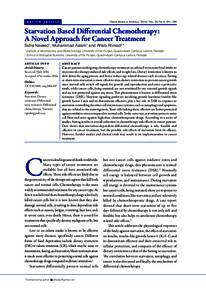وثيقة
Starvation based differential chemotherapy : a novel approach for cancer treatment.
المعرف
DOI 10.5001/omj.2014.107
المساهمون
Aslam, Muhammad., مؤلف
Ahmad, Aftab., مؤلف
الناشر
Oman Medical Specialty Board.
ميلادي
2014-11
اللغة
الأنجليزية
الموضوع
الملخص الإنجليزي
Cancer patients undergoing chemotherapy treatment are advised to increase food intake to overcome the therapy-induced side effects, and weight loss. Dietary restriction is known to slow down the aging process and hence reduce age-related diseases such as cancer. Fasting or short-term starvation is more effective than dietary restriction to prevent cancer growth since starved cells switch off signals for growth and reproduction and enter a protective mode, while cancer cells, being mutated, are not sensitized by any external growth signals and are not protected against any stress. This phenomenon is known as differential stress resistance (DSR). Nutrient signaling pathways involving growth hormone/insulin-like growth factor-1 axis and its downstream effectors, play a key role in DSR in response to starvation controlling the other cell maintenance systems, such as autophagy and apoptosis, that are related to the tumorigenesis. Yeast cells lacking these effectors are better protected against oxidative stress compared to normal cells. In the same way, starvation protects many cell lines and mice against high-dose chemotherapeutic drugs. According to a series of studies, fasting results in overall reduction in chemotherapy side effects in cancer patients. Data shows that starvation-dependent differential chemotherapy is safe, feasible and effective in cancer treatment, but the possible side effects of starvation limit its efficacy. However, further studies and clinical trials may result in its implementation in cancer treatment.
المجموعة
URL المصدر
قالب العنصر
مقالات الدوريات

